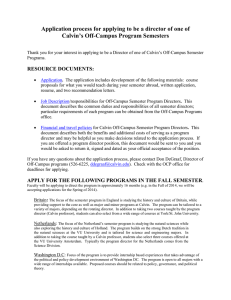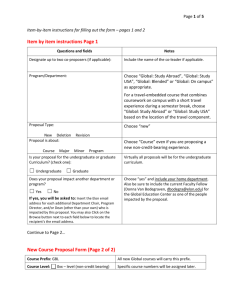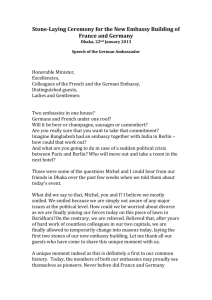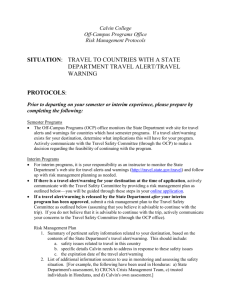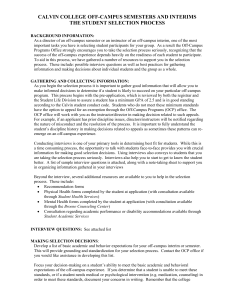Student Orientation Checklist
advertisement
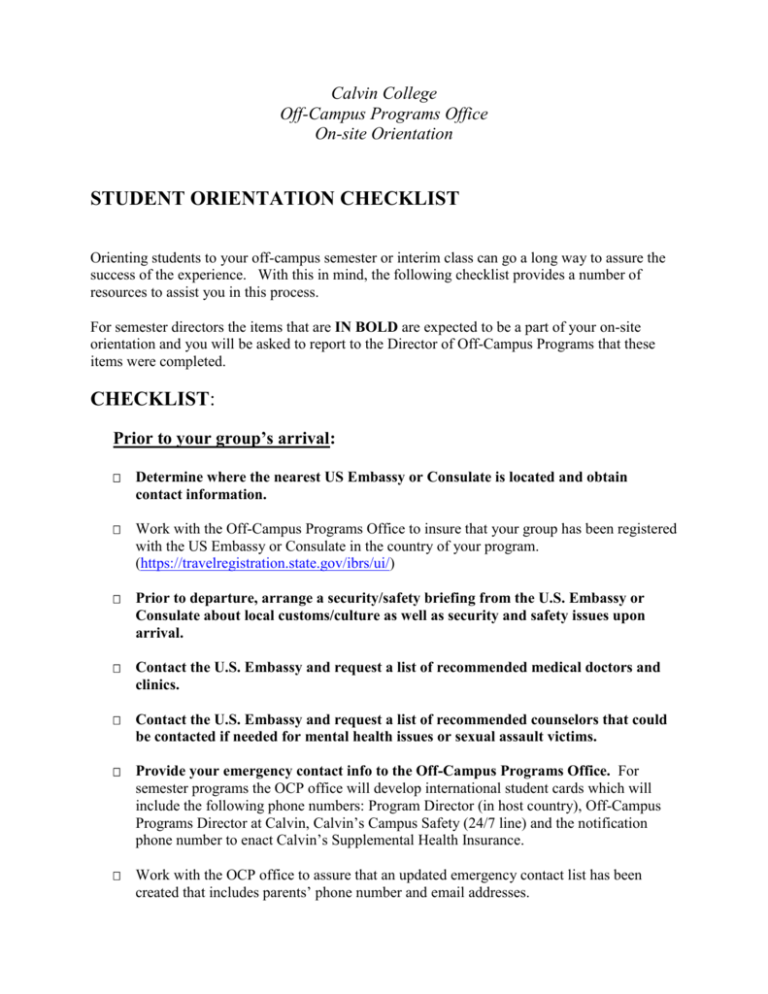
Calvin College Off-Campus Programs Office On-site Orientation STUDENT ORIENTATION CHECKLIST Orienting students to your off-campus semester or interim class can go a long way to assure the success of the experience. With this in mind, the following checklist provides a number of resources to assist you in this process. For semester directors the items that are IN BOLD are expected to be a part of your on-site orientation and you will be asked to report to the Director of Off-Campus Programs that these items were completed. CHECKLIST: Prior to your group’s arrival: Determine where the nearest US Embassy or Consulate is located and obtain contact information. Work with the Off-Campus Programs Office to insure that your group has been registered with the US Embassy or Consulate in the country of your program. (https://travelregistration.state.gov/ibrs/ui/) Prior to departure, arrange a security/safety briefing from the U.S. Embassy or Consulate about local customs/culture as well as security and safety issues upon arrival. Contact the U.S. Embassy and request a list of recommended medical doctors and clinics. Contact the U.S. Embassy and request a list of recommended counselors that could be contacted if needed for mental health issues or sexual assault victims. Provide your emergency contact info to the Off-Campus Programs Office. For semester programs the OCP office will develop international student cards which will include the following phone numbers: Program Director (in host country), Off-Campus Programs Director at Calvin, Calvin’s Campus Safety (24/7 line) and the notification phone number to enact Calvin’s Supplemental Health Insurance. Work with the OCP office to assure that an updated emergency contact list has been created that includes parents’ phone number and email addresses. During the first few days in-country: Plan a day or two retreat for students to prepare them for semester. Include a wide range of activities from group bonding exercises, to cultural orientations, to risk management protocols. Retreat could include a wide range of activities including: Discuss region-specific health information such as the nature, prevention, and treatment of region-specific diseases; required and recommended vaccinations, water and food risks; and, descriptions of persistent and epidemic diseases. Give general instruction for emergency medical situations – contacting emergency response personnel, medical services available, etc. Have students investigate and practice how to make a 911 call and if the call will include all emergency services such as police, ambulance, and fire department. Make sure all students know how to initiate emergency response services in your host country. Emergency numbers around the globe: http://www.clearcausefoundation.org/#!emergency-numbers/c1xic If given permission by student(s) with potential medical conditions and/or taking medications, determine if others in the group need to know this information for the safety and well-being of the group. Educate yourself and the group about unique local laws. For example, the ramifications of public intoxication or drug use. These are presented in the State Departments Country information sheets: http://travel.state.gov/content/travel/english.html Have several conversations about risk management and the need of students to be a partner in helping keep everyone safe. Point out where the risk management protocols are located and how students might use them in an emergency. o In addition, have the group complete several Table Top exercises related to risk management and keeping each other safe while abroad. A number of table top exercises are available on the OCP Director Resource page under orientation resources. o Discuss the need for students to inform you if they are planning to do any independent travel during the semester – have students complete a Independent Travel Form. Emphasize appropriate dress and respectful actions while visiting the host country Give tips for travel safety to minimize the possibility of being a victim of crime Do a orientation to the city, make it a challenge by breaking the group into groups of four and do a photo scavenger hunt, asking students to provide pictures of the group at: o o o o o o The local hospital, where good medical care and English speaking medical staff are available -http://travel.state.gov/content/passports/english/emergencies.html The United States Embassy or Consulate The local market Mass transit station Student resources at the university The Police station: (If possible) attend a security/safety briefing from the U.S. Embassy or Consulate about local customs/culture as well as security and safety issues upon arrival. Select and train an Alternate Trip Leader(s). This is especially important where only one Calvin Faculty or Staff Member is leading the experience (see additional protocols under Director Illness). Have some fun together: Go for a hike, have dinner together, do a city tour, etc! Have students share their life stories. Use an exercise like describing a RIVERTOOTH in your life. Developed some shared expectations with the group and discuss how students can support each other and hold each other accountable throughout the experience. One possible exercise that you could adapt can be found under creating a group covenant under the orientation resources on the Director Resource page of the Off-Campus Semester website. Introduce the idea of cultural shock and how students might be impacted. Useful handout can be found under Curriculum Resources on the Director Resource page of the OffCampus Semester website.

